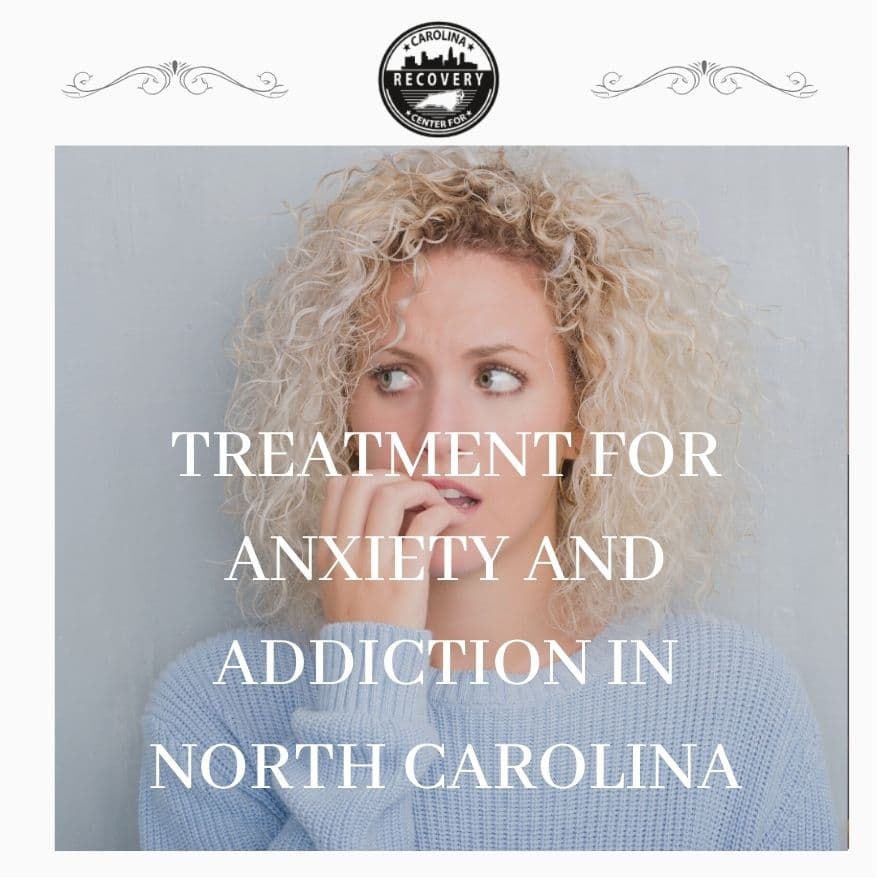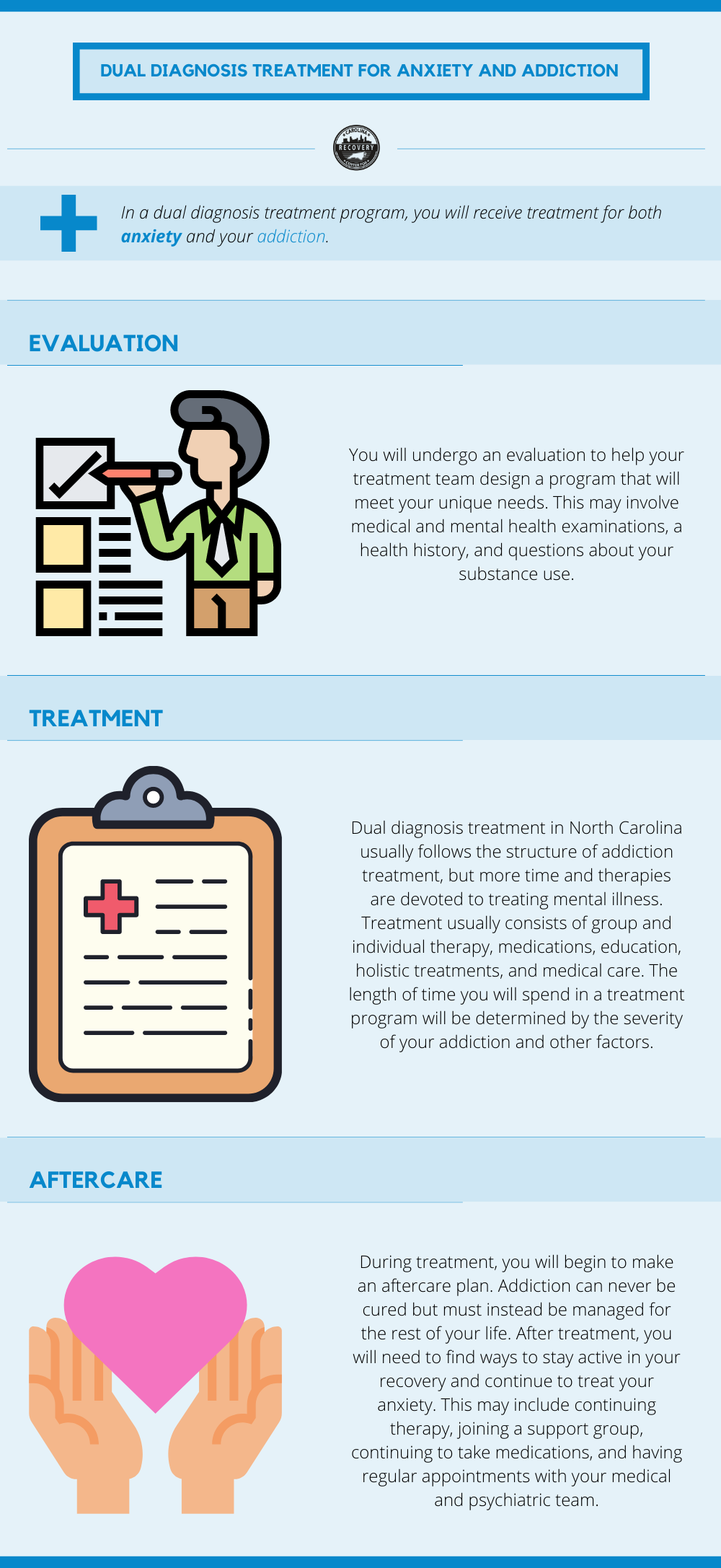Treatment for Anxiety and Addiction in North Carolina

Medically Verified: 2/1/24
Medical Reviewer
Chief Editor

All of the information on this page has been reviewed and verified by a certified addiction professional.
Anxiety is common in the United States. About 18% of adults living in this country suffer from some kind of anxiety.[1] Anxiety, like other common forms of mental illness, is treatable. Many people learn how to manage the symptoms of their anxiety so they can function normally. However, some people who suffer from anxiety attempt to manage it on their own, and many use drugs or alcohol to numb their discomfort. This is called “self-medication”.
Research suggests that people who suffer from both a mental illness and addiction may have differences in the way their brains function. These differences are believed to make them more susceptible to each condition. When someone suffers from addiction and a mental health condition, including anxiety, they require treatment for both conditions at the same time. This is because anxiety can contribute to addiction, and addiction can exacerbate anxiety.
By treating both the mental health condition and the addiction simultaneously, you have a better chance at recovering fully from both and learning the skills you need to live a healthy, fulfilling life. Treatment for anxiety and addiction in North Carolina can help.
How are Anxiety and Addiction Related?
Anxiety is a common mental health condition that causes people to have an exaggerated fear response to things that aren’t necessarily dangerous. It is marked by increased fear and nervousness, as well as physical symptoms like a racing heart, sweating, shaking, and upset stomach. There are many types of anxiety. Some of the most common are generalized anxiety, social anxiety, and post-traumatic stress disorder (PTSD).
Anxiety can interfere with a person’s ability to live a healthy, balanced life or to function in their day-to-day responsibilities. Anxiety makes it difficult for people to work, perform self-care, or maintain healthy relationships. It can keep people from getting the sleep they need to function well in their daily life.[2]
Many people attempt to self-medicate when they have anxiety. This may involve taking drugs or drinking alcohol to numb the intensity of their anxiety and allow them to function. However, relying on drugs or alcohol to help manage anxiety can lead to physical and emotional dependence or addiction.
Why is it Important to Get Treatment for Anxiety and Addiction at the Same Time?
If someone has a dual diagnosis of anxiety and addiction, it is important that they receive treatment for both conditions at the same time to have the best chance of overcoming them. Oftentimes, when someone has a dual diagnosis, they only receive addiction treatment. This leaves their mental health condition untreated. Even if they do complete addiction treatment, the symptoms of their mental illness can lead to a relapse in the future.
Similarly, if someone only receives treatment for their anxiety but does not learn how to manage their addiction, their addiction can exacerbate their mental illness. An untreated addiction can interfere with a person’s ability to effectively manage their mental health and participate in treatment for it.
If you have a dual diagnosis and require both addiction treatment and treatment for anxiety or another mental illness, you must receive care from a facility that can offer comprehensive dual diagnosis treatment.
What Happens in Dual Diagnosis Treatment for Anxiety and Addiction?

In a dual diagnosis treatment program, you will receive treatment for both anxiety and your addiction. Generally, addiction treatment happens in stages.
Evaluation
You will undergo an evaluation to help your treatment team design a program that will meet your unique needs. This may involve medical and mental health examinations, a health history, and questions about your substance use.
Treatment
Dual diagnosis treatment in North Carolina usually follows the structure of addiction treatment, but more time and therapies are devoted to treating mental illness. Treatment usually consists of group and individual therapy, medications, education, holistic treatments, and medical care. The length of time you will spend in a treatment program will be determined by the severity of your addiction and other factors.
When it comes to treating anxiety, you will learn how to make lifestyle changes that can help you cope with your symptoms. You will also learn how to identify different situations that trigger your anxiety. In severe cases, anxiety may be treated with non-narcotic medications like propranolol.[4]
Aftercare
During treatment, you will begin to make an aftercare plan. Addiction can never be cured but must instead be managed for the rest of your life. After treatment, you will need to find ways to stay active in your recovery and continue to treat your anxiety. This may include continuing therapy, joining a support group, continuing to take medications, and having regular appointments with your medical and psychiatric team.
Dual diagnosis treatment offers people the chance to get high-quality, tailored treatment for their mental illness and their addiction at the same time. This offers people the best chance for a full recovery from both conditions. It is crucial to seek treatment for a dual diagnosis at a facility that is qualified to offer this type of comprehensive treatment.
Find Treatment for Anxiety and Addiction in North Carolina
If you or someone you love requires treatment for a mental health condition, addiction, or dual diagnosis, please reach out to the staff at the Carolina Center for Recovery. Whether you live in North Carolina or want to travel here for high-quality care, we would be happy to work with you. We offer a range of programs, including treatment for anxiety and addiction, that can help you leave your addiction behind and move towards a healthy future.
If you are ready for life-changing treatment, don’t wait another day. Call today to speak with one of our compassionate admissions counselors.
References:

